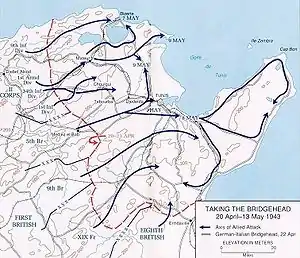Battle of Hill 609
The Battle of Hill 609 took place at Djebel Tahent in northwestern Tunisia during the Tunisian campaign of World War II. The battle was for control over the key strategic height Hill 609 and its surrounding area between the American forces of the U.S. II Corps and German units of the Afrika Korps.[1] The battle proved a formative experience for the American forces - in their first clear-cut victory of the campaign, and has been called "the American Army's coming-of-age."[2][3]
| Battle of Hill 609 | |||||||
|---|---|---|---|---|---|---|---|
| Part of the Tunisian campaign of World War II | |||||||
 Tunisian campaign operations 20 April to 13 May 1943. | |||||||
| |||||||
| Belligerents | |||||||
|
|
| ||||||
| Commanders and leaders | |||||||
|
|
| ||||||
| Strength | |||||||
| II Corps | Afrika Korps | ||||||
| Casualties and losses | |||||||
| 2,453[1] | Unknown | ||||||
Battle
In late April 1943, Hill 609 was the key to the German defensive line facing the U.S. II Corps, commanded by Major General Omar Bradley. The German general, Hans-Jürgen von Arnim, used the hill for artillery fire and observation. From the hill, the Germans could also prevent movement by both the 1st Infantry Division, commanded by Major General Terry Allen, to the south and the 9th Infantry Division, commanded by Major General Manton S. Eddy, to the north. Hill 609 was deemed one of the most difficult objectives in Tunisia, not only protected by steep slopes and artillery but also by fire from nearby high grounds, which gave the Germans a cross fire on the slopes leading up to it.[4] After rejecting the proposition of bypassing the mountain, Bradley ordered the 34th Infantry Division, commanded by Major General Charles W. Ryder, to take the hill.[1] After heavy fighting and high casualties, the 34th Division managed to take the hill by April 30 and the following day repelled several German counterattacks.[1]
See also
References
- Howe, George F. (1957). "Chapter XXXIII: The Advance to Mateur". United States Army in World War II: Mediterranean Theater of Operations: Northwest Africa: Seizing the Initiative In the West. Washington, D.C.: Office Of The Chief Of Military History, Department Of The Army. Retrieved August 24, 2015.
- Weigley, Russell F. (December 1, 2002). "The Wars in North Africa". The New York Times. Retrieved August 24, 2015.
- Nathan S, Lowrey (2016). The Chairmanship of the Joint Chiefs of Staff 1949-2016. Government Printing Office. p. 147. ISBN 9780160933219.
- Ambrose, Stephen (2001). Supreme Commander: The War Years of Dwight D. Eisenhower. Oxford, United States: Roundhouse Publishing Ltd. pp. 186–187. ISBN 978-1-57806-206-5.